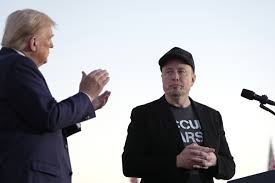A diplomatic spat is presently emerging between South Africa’s land reform policy and the United States, stemming from a disagreement between the leaders of the two nations regarding some specifics of the recently enacted Expropriation Act, which was signed into law on January 23, 2025.
The disagreement comes as US President Donald Trump publicly opined that the Expropriation Act could lead to racial discrimination in property rights, while South African President Cyril Ramaphosa maintained that the act is backed by the rule of law and it’s a necessary step towards rectifying historical injustices where black South Africans were systematically dispossessed of land.
Trump, who spoke on Sunday, threatened to cut off future funding to South Africa over what he described as land confiscation and poor treatment of certain classes of people, particularly alleging mistreatment of white farmers.
His statements were made via posts on Truth Social, where he called for a full investigation into these allegations.
While Trump didn’t reveal much, his critique seems to stem from South Africa’s land reform policy, which allows for land expropriation without compensation under specific conditions aimed at addressing historical land disparities from apartheid.
“South Africa is confiscating land, and treating certain classes of people very badly. I will be cutting off all future funding to South Africa until a full investigation of this situation has been completed!” Trump wrote on his Truth Social platform.
Later, in a briefing with journalists, Trump said that South Africa’s “leadership is doing some terrible things, horrible things” without giving examples.
“So, that’s under investigation right now. We’ll decide, and until we find out what South Africa is doing–they’re taking away land and confiscating land, and actually, they’re doing things that are perhaps far worse than that,” he added.
Trump’s critique was also reinforced by American billionaire and business magnate, Elon Musk.
Musk who was born in Pretoria, South Africa, has been championing the cause of white land-owners.
The American billionaire publicly criticized the South African President for signing the Expropriation Act into law, specifically questioning what he described as “openly racist ownership laws.”
However, Ramaphosa, who took to his official X(formerly Twitter) on Monday firmly denied that the government is confiscating land.
He emphasized that South Africa operates as a constitutional democracy with strong adherence to the rule of law, justice, and equality.
Ramaphosa clarified that the Expropriation Act is not intended as a tool for land seizure but is a legal process to ensure equitable land access, guided by the country’s constitution.
He also highlighted the need for public usage of land balanced with the protection of property rights.
In response to Trump’s threats, Ramaphosa appeared to challenge the US President, noting that aside from the President’s Emergency Plan for AIDS Relief (PEPFAR), the US does not offer significant funding to South Africa.
Ramaphosa asserted: “South Africa is a constitutional democracy that is deeply rooted in the rule of law, justice and equality. The South African Government has not confiscated any land.
“The recently adopted Expropriation Act is not a confiscation instrument, but a constitutionally mandated legal process that ensures public access to land in an equitable and just manner as guided by the constitution.
“South Africa, like the United States of America and other countries, has always had expropriation laws that balance the need for public usage of land and the protection of rights of property owners. We look forward to engaging with the Trump administration over our land reform policy and issues of bilateral interest. We are certain that out of those engagements, we will share a better and more common understanding of these matters.
“The US remains a key strategic political and trade partner for South Africa. With the exception of PEPFAR Aid, which constitutes 17% of South Africa’s HIVAids programme, there is no other funding that is received by South Africa from the United States.”
It would be recalled that the issue of land reform in South Africa has long been contentious, intending to rectify the imbalances caused by decades of apartheid where land was predominantly owned by white South Africans.
South Africa’s land reform history is deeply intertwined with its colonial and apartheid past, as well as its efforts towards post-apartheid reconciliation and equality.
The process began with Dutch and British colonial settlement. The Natives Land Act of 1913 was pivotal, restricting black South Africans to just 7% of the land, later increased to about 13% by the 1936 Native Trust and Land Act.
Also, land was set aside for black South Africans in “native reserves,” enforcing a system of segregation that would later be formalized by apartheid.
During the apartheid era which began in 1948 and lasted till 1994, laws were enacted that further entrenched spatial segregation, relocating millions of black, coloured, and Indian South Africans to designated “group areas,” often far from urban centres and economic opportunities.
Millions were moved, notably from Sophiatown to Soweto, and from District Six in Cape Town, leading to significant social upheaval and loss of property.
Following the end of the apartheid era, new laws began to emerge with the first being the 1996 Constitution. The Constitution, particularly Section 25, sets the legal framework for land reform, recognizing property rights but also allowing for expropriation for public interest with just and equitable compensation.
The laws were amended until recently when the Expropriation Act was enacted.
The act has now been a significant point of discussion and contention both domestically and internationally.
The act replaces the apartheid-era Expropriation Act of 1975, aiming to align expropriation laws with South Africa’s post-apartheid Constitution.
The South African government had explained that the Act is designed to outline how the state can expropriate property for public purposes or in the public interest.
The Act specifies that expropriation can occur for public purposes or in the public interest. This includes land reform, promoting inclusivity, and equitable access to natural resources.
One of the most debated aspects is the provision for “nil compensation” under certain conditions like speculative land holding, abandoned properties, or land posing health risks. The Act allows for judicial review where courts can determine if nil compensation is just or if some compensation is due, emphasizing the constitutional protection of property rights.





